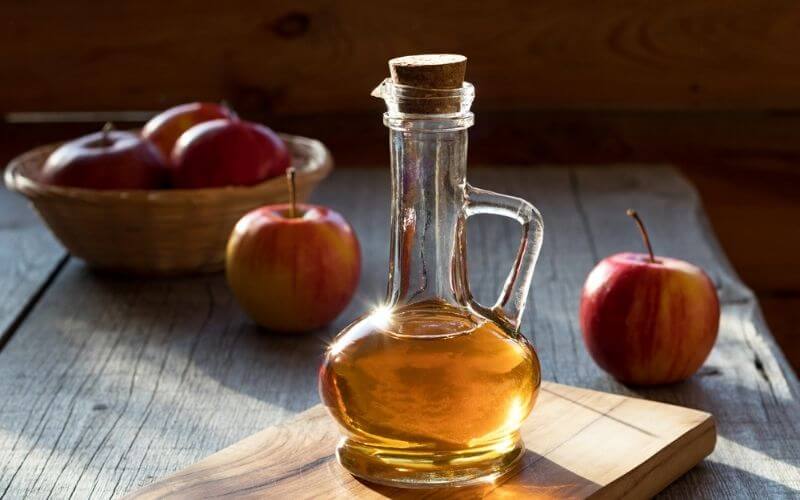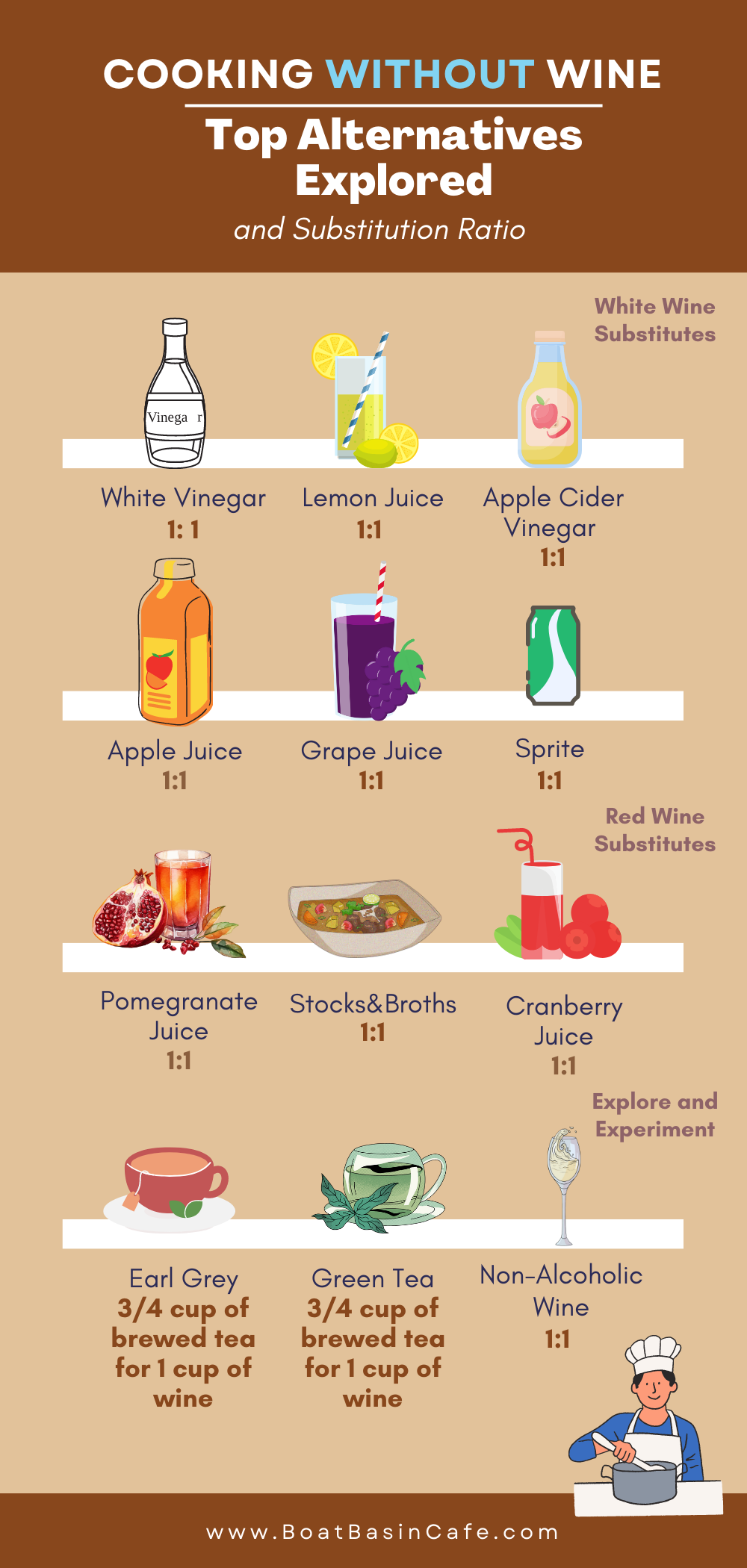Cooking without wine is an intriguing proposition for any experiment-driven cook intrigued by playing with flavors. The magic of a good wine in an array of dishes is undisputed, but venturing beyond the vine opens up a myriad of exciting culinary landscapes. Let’s explore the fascinating world of wine-free cooking, where flavor is the celebration, sans the vino!
There could be numerous reasons for you to seek wine alternatives in your culinary playground. Perhaps you lead a no-alcohol lifestyle or are pursuing a healthier lifestyle. Either way, navigating through a recipe that calls for a generous swig of Merlot or Chardonnay can be intriguing, and of course, challenging.
| Wine Type | Alternative Substitutes | Typical Substitution Ratio | Dish Examples |
|---|---|---|---|
| White Wine | Vinegars (apple cider, white wine) | 1:1, dilute with water/broth | Marinades, Stews |
| Lemon Juice | 1:1, use in marinades | Marinades | |
| Fruit Juices (apple, grape, tomato) | 1:1 | Stews, Pasta | |
| Sodas (ginger ale, sprite) | 1:1, adjust sugar content | Varieties of dishes | |
| Red Wine | Stocks & Broths (beef, vegetable) | 1:1 | Meatball Recipe, Coq au Vin |
| Fruit Juices (pomegranate, cranberry) | 1:1 | Roast Dinners | |
| Both Types | Teas & Infusions (Earl Grey, green tea) | 3/4 cup of brewed tea for 1 cup of wine | Delicate Dishes |
| Non-Alcoholic Wine | 1:1 | Classic Wine Dishes |
Why Seek Alternatives: Benefits and Considerations
Apart from catering to unique lifestyle choices, there are several health benefits associated with cooking without wine. From reducing calorie count to eliminating the risk of possible over-consumption, cooking sans wine can result in pleasantly surprising flavor profiles.
Alcohol-Free Lifestyle – A Royal Feast
For many reading this, aligning cooking with personal principles or religious reasons might be the influencing factor. No worries, a splash of wine can always be replaced, and you’ll learn how right here.
Healthier Living – The Culinary Way
Those of you embarking on a healthy living journey have come to the right place! Cooking without wine can help reduce your dishes’ calorie count and open up a brand-new dimension in terms of distinct flavor profiles.
Now, armed with the ‘Why’, let’s explore the ‘What’.
White Wine Alternatives in Cooking: Say Hello to New Flavors
When the question is a substitute for white wine in cooking, the answers are many and mouth-watering!
The Vinegar Verve

The most common, and undoubtedly effective, alternative to wine is vinegar. Especially when it comes to replacing white wine, both apple cider vinegar and white wine vinegar can successfully bridge the gap. With the right amount of tart, they bring in the much-needed acidity, without overpowering the base flavor. Remember, vinegar variants are mighty powerful, so they should always be diluted with water or broth.
Fruit Juices – The Sweet Surprise
Moving onto a different path, fruit juices are unexplored territories when it comes to being a cooking wine alternative. Tomato, apple, or grape juice can add a subtle sweetness to your dishes. Cooking grape juice, in particular, has a concentrated, syrupy flavor that infuses the meat with a velvety texture that no wine can compete with!
Carbonated Twist: Sodas Are Here

Replacing wine with soft drinks such as ginger ale or sprite can be quite the revelation you never expected! The carbonation adds a bit of a fizz, while the sweetness opens up a different flavor profile altogether.
Read this article for more Substitute White Wine Vinegar.
Red Wine Substitutes: A Class of Their Own
Who knew that the substitute for red wine in cooking can match, if not exceed, the flavor-explosion that the traditional ingredient promises!
Stocks and Broths – A Robust Replacement

Red wine substitutes are further proof of how stocks and broths are indeed the heart and soul of many recipes. Whether you choose beef stock, vegetable broth or even mushroom stock, these can replace wine to add a depth and complexity to dishes that you may not have experienced before!
Fruit Juices – The Versatile Stand-ins
From a red wine replacer in coq au vin to bringing a delightful depth to hearty stews or roast dinners, cranberry and pomegranate juices offer robust flavors that promise to be a hit at your next dinner.
Beyond Wines – Explore and Experiment
The best non-alcoholic alternatives to wine in dishes are not restricted to mimicking its acidity or sweetness; it’s about creating a unique dining experience that delights you in a new, exciting way.
🫖Teas and Infusions – A Delicate Flavour Dance
For the lighter, more mellow dishes, a green tea infusion, or a mild Earl Grey can replace wine and add an aromatic, fulfilling flavor.
🍷Non-Alcoholic Wine – The Nearest Neighbor
Last but not least, if you still cannot part ways from the classic, why not opt for non-alcoholic wine! Keep the essence preserved, from the tannin structure to the depth of flavor.
The Balancing Act – Adjusting Recipes When Omitting Wine
Remember, the best cooks adapt and improvise! Replacing wine means adjusting certain aspects of your recipe, whether it’s the sugar quantity if using a sweet alternative or altering the cooking time if your substitute does not evaporate as quickly as wine.
Final Thoughts: The Exciting World Beyond Wines
Limitations indeed spur creativity. This expansive list of wine alternatives highlights a world of flavors waiting to be explored and cherished. So match the search intent and user expectations with a fun, new world of alternative ingredients that deliver the taste and health benefits. Whether you choose to substitute out of necessity or choice, remember that each of these options introduces you to a rare, exotic world of textures and flavors. So, gear up and add a twist to your culinary adventures – the world beyond wine awaits you!
Further Reading
- Healthline Article – Wine Alternatives and Benefits
- Nutritional Guide – What happens when you stop consuming alcohol
Pin Later

